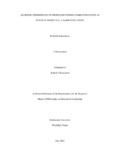
Please use this identifier to cite or link to this item:
https://hdl.handle.net/20.500.14301/139| Title: | LEARNING EXPERIENCES OF FRONTLINE NURSES COMBATING COVID-19 IN PUBLIC HOSPITALS: A NARRATIVE STUDY |
| Authors: | Bajracharya, Rashmila |
| Citation: | Bajracharya, R.(2022).Learning experiences of frontline nurses combating Covid-19 in public hospitals: A narrative study. |
| Issue Date: | Jul-2022 |
| Publisher: | Kathmandu University School of Education |
| School: | SOED |
| Department: | DOEL |
| Level: | M.Phil. |
| Program: | MPhil in Educational Leadership |
| Abstract: | Combating COVID-19 by frontline nurses is highly concerned to manage and maintain the health care delivery system through qualitative services to the infected people. If nurses do not agree to the frontline role to combat COVID-19, it might create massive crisis in health sectors. Thus, they are motivated, guided and supported by family, society and hospital authorities. Obligatory provisions create conflict in taking roles and responsibilities as frontline nurses to combat in challenging situations like the COVID-19 pandemic. The purpose of this study was to explore the learning experiences of frontline nurses combating COVID-19 in the public hospitals of Kathmandu valley. Furthermore, this study has explored their stories of combating COVID-19. Philosophically, this study is guided by interpretive paradigm utilizing the qualitative design with narrative inquiry. Stories were collected using face to face interview with six frontline nurses (seniors and juniors) working at COVID special units in three different public hospitals of Kathmandu valley. I have interpreted shared stories of combating experiences and learning, using self-efficacy theory and resilience theory. This study revealed that the participants faced many challenges like risk of disease transmission with psychological effect, physical issues related to the wearing of PPEs, overloaded, hectic shifts and more. Managerial issues included scarcity of human resources and safety measures especially PPEs, mismatched nurse/ patient ratio, fluctuated rules and regulations, lack of standard protocol and lack of infrastructure for specific COVID units. However, they were able to cope with tough situations taking frontline roles, standing on their self-willingness, support of family and organization. Similarly, it was possible due to the nursing education that taught personal and professional ethics or their altruistic nature. In addition, they also benefitted acquiring various skills related to patient care practices, managerial and leadership roles as well as understanding philosophy of life while going through the critical time of crisis in the health sector. Self-efficacy and being resilient are possible only through support system of the family, organizations and society as well as self-willingness, self-commitment and maturity of the individual while combating and grasping the opportunity to learn. Similarly, they were fully satisfied for the opportunity on acquiring novel skills in patient care, leadership and managerial skills accordingly. Those skills empowered them to face and tackle situations for the future i.e., third wave. Nurses have good nature to dedicate themselves in patient care that might be supportive to combat such situation. They have also developed advance nursing skills as a result of learning through this COVID 19 pandemic. Furthermore, frontline nurses were able to combat COVID-19 successfully as they did not transmit disease on themselves and family too. They were fully aware on their job and professional values even in such challenging situations. Similarly, they learnt to cope and combat this devastating COVID-19. Nowadays, they are happy, satisfied and proud with their roles that they had during the health emergency of COVID-19 pandemic and the commitment they fulfilled. |
| URI: | https://hdl.handle.net/20.500.14301/139 |
| Appears in Collections: | Dissertation |
Files in This Item:
| File | Description | Size | Format | |
|---|---|---|---|---|
| Rashmila Bajracharya after english correction latest .pdf | 1.27 MB | Adobe PDF |  View/Open |
Items in DSpace are protected by copyright, with all rights reserved, unless otherwise indicated.